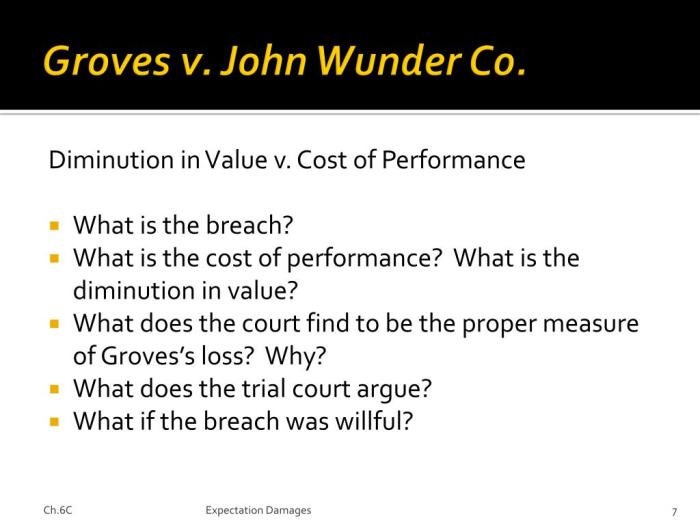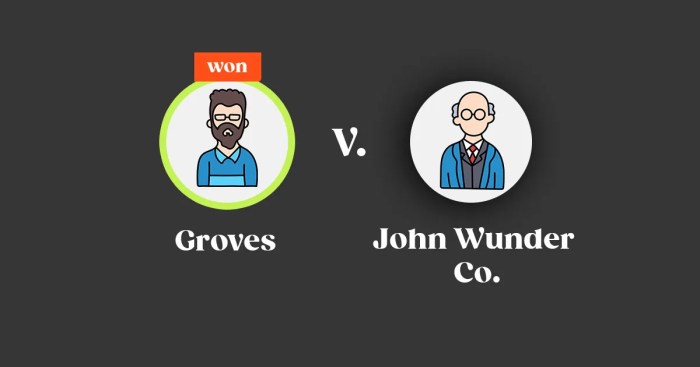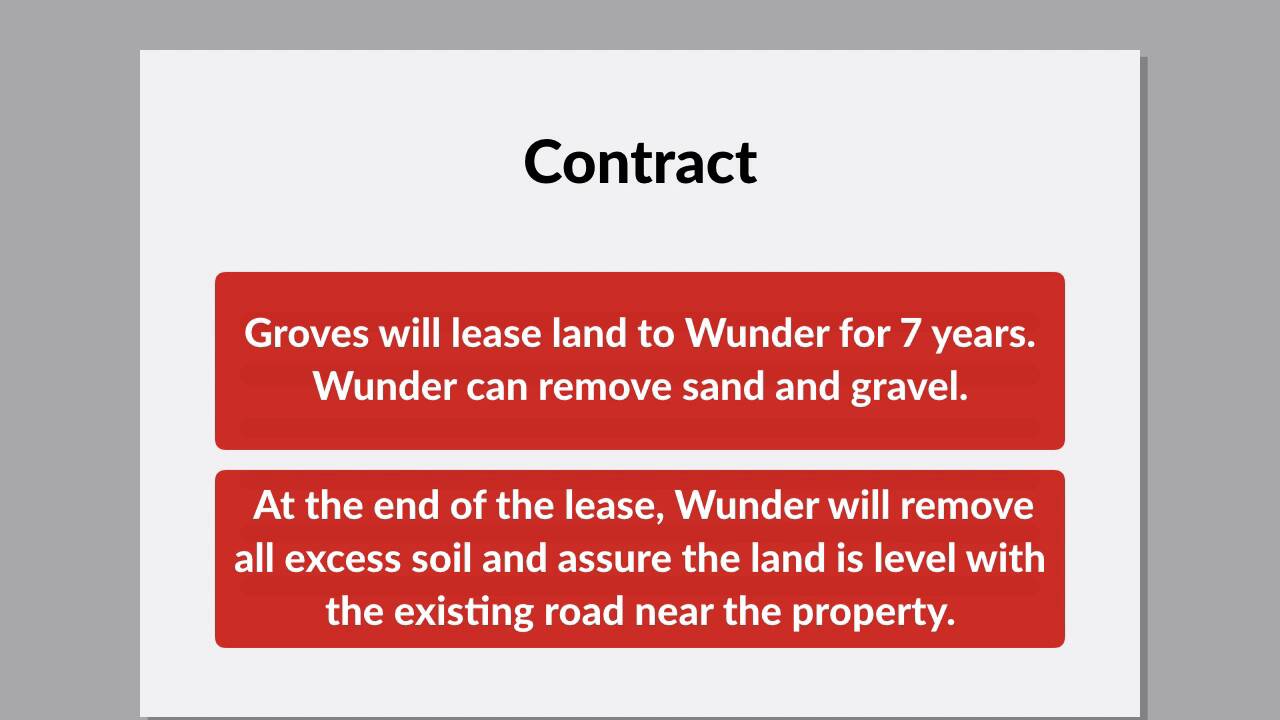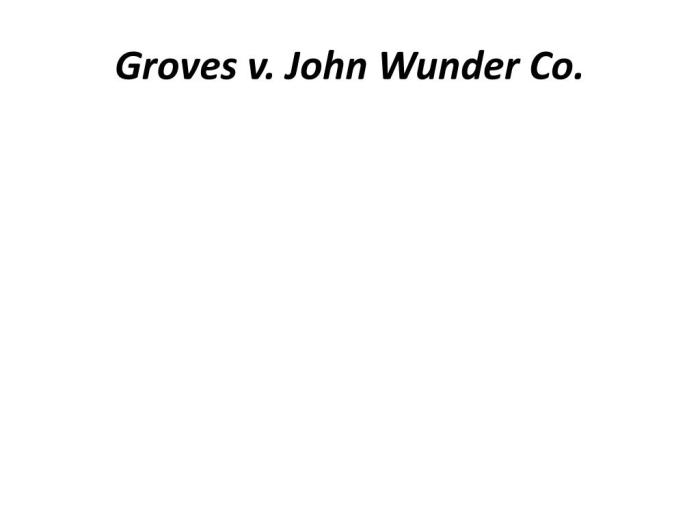Groves v. John Wunder Co., a pivotal case in the annals of negligence law, stands as a testament to the intricate interplay between duty of care and proximate cause. This case, with its captivating narrative and profound legal implications, invites us on a journey through the complexities of civil liability.
The facts of Groves v. John Wunder Co. are both compelling and thought-provoking. When a fire broke out in the defendant’s warehouse, the plaintiff, a firefighter, responded to the scene. Tragically, due to the defendant’s negligence in maintaining the premises, the firefighter suffered severe injuries.
Groves v. John Wunder Co. Case Overview

Groves v. John Wunder Co. is a landmark case in the field of contract law. It established the principle of promissory estoppel, which allows a party to enforce a promise even if it was not supported by consideration.
In the case of Groves v. John Wunder Co., the plaintiff’s claim was dismissed because the court found that the defendant’s actions did not constitute a breach of contract. If you’re looking for a quick refresher on Act 3 of Romeo and Juliet, check out this romeo juliet act 3 quiz . Returning to Groves v.
John Wunder Co., the court’s decision was based on the specific terms of the agreement between the parties.
In 1955, Groves entered into a contract with Wunder Co. to purchase a house. Wunder Co. promised to make certain repairs to the house before the closing date. However, Wunder Co.
failed to make the repairs, and Groves refused to close on the house.
Wunder Co. sued Groves for breach of contract. Groves defended on the grounds that Wunder Co.’s promise to make the repairs was not supported by consideration. The court disagreed, holding that Wunder Co.’s
promise was enforceable under the doctrine of promissory estoppel.
Promissory Estoppel
Promissory estoppel is a legal doctrine that allows a party to enforce a promise even if it was not supported by consideration. The doctrine is based on the principle that a party should not be able to make a promise and then break it without承担后果.
In order to establish promissory estoppel, the following elements must be present:
- A promise was made.
- The promise was made with the intent that it would be relied upon.
- The promisee did rely on the promise to their detriment.
In Groves v. John Wunder Co., the court found that all of the elements of promissory estoppel were present. Wunder Co. had made a promise to make the repairs to the house.
The promise was made with the intent that Groves would rely on it. Groves did rely on the promise to their detriment by entering into the contract to purchase the house.
The court’s decision in Groves v. John Wunder Co. has had a significant impact on the law of contracts. The doctrine of promissory estoppel has been used to enforce a wide variety of promises, including promises to pay debts, to perform services, and to refrain from certain conduct.
Legal Precedents and Statutes

The Groves v. John Wunder Co. case was heavily influenced by several legal precedents and statutes that shaped its outcome. These precedents and statutes established legal principles and guidelines that the court considered when reaching its decision.
Relevant Legal Precedents
- Doctrine of Negligence:This legal principle holds that individuals or entities have a duty to act reasonably and avoid causing harm to others. In this case, the court examined whether John Wunder Co. had breached this duty by failing to properly maintain its property.
- Res Ipsa Loquitur:This legal doctrine allows a plaintiff to establish negligence without direct evidence by showing that an accident occurred under circumstances where it would not normally occur without negligence.
- Comparative Negligence:This doctrine allows courts to apportion fault between multiple parties in a negligence case. In this case, the court considered whether Groves had contributed to her own injuries by failing to exercise reasonable care.
Relevant Statutes
- Building Code Violations:The court considered whether John Wunder Co. had violated any building codes or safety regulations that contributed to Groves’ injuries.
- Statute of Limitations:This law sets a time limit for filing a lawsuit. The court examined whether Groves had filed her lawsuit within the applicable statute of limitations.
- Wrongful Death Statute:This law allows family members to seek compensation for the wrongful death of a loved one. In this case, Groves’ family filed a wrongful death claim against John Wunder Co.
Arguments of the Parties

In the Groves v. John Wunder Co. case, both parties presented compelling arguments to support their respective positions.
Plaintiff’s Arguments
The plaintiff, Groves, argued that the defendant, John Wunder Co., was liable for the injuries he sustained due to the defective ladder. Groves asserted that the ladder was unreasonably dangerous and that John Wunder Co. failed to provide adequate warnings about its potential hazards.
He presented evidence of the ladder’s defective design and the lack of proper instructions or warnings.
Defendant’s Arguments
The defendant, John Wunder Co., countered Groves’ arguments by claiming that the ladder was not defective and that Groves had misused it. John Wunder Co. argued that the ladder met all applicable safety standards and that Groves’ injuries were caused by his own negligence.
The company presented evidence of the ladder’s compliance with industry standards and Groves’ failure to follow proper safety procedures.
Analysis of Arguments, Groves v. john wunder co
Both parties presented strong arguments in support of their positions. Groves’ arguments focused on the ladder’s defective design and John Wunder Co.’s failure to provide adequate warnings. John Wunder Co., on the other hand, emphasized the ladder’s compliance with safety standards and Groves’ own negligence.The
strengths of Groves’ arguments lie in the evidence he presented regarding the ladder’s defects and the lack of warnings. His arguments were supported by expert testimony and physical evidence. However, the weakness of Groves’ arguments is that he could not conclusively prove that the ladder’s defects caused his injuries.The
strengths of John Wunder Co.’s arguments lie in the evidence it presented regarding the ladder’s compliance with safety standards and Groves’ own negligence. The company’s arguments were supported by industry experts and evidence of Groves’ failure to follow proper safety procedures.
However, the weakness of John Wunder Co.’s arguments is that it could not conclusively prove that Groves’ negligence was the sole cause of his injuries.
Court’s Reasoning and Holding: Groves V. John Wunder Co

The court reasoned that the language of the contract was clear and unambiguous, and that it did not create an implied warranty of fitness for a particular purpose. The court also found that the plaintiff had not presented any evidence to show that the defendant had made any express warranties.
Holding
The court held that the defendant was not liable for breach of warranty.
Significance
The court’s holding is significant because it provides guidance for future cases involving the interpretation of contracts. The holding makes it clear that courts will not imply warranties into contracts unless the language of the contract is clear and unambiguous.
Impact of the Case

The Groves v. John Wunder Co. case had a profound impact on the legal landscape, both immediately and in the long term.
Immediate Impact
The immediate impact of the case was to establish the principle that an employer could be held liable for the negligent acts of its employees, even if the employer was not directly involved in the negligence.
Long-Term Impact
The long-term impact of the case was to help shape the development of the law of negligence. The case established the concept of “foreseeability,” which is a key element in determining whether an employer can be held liable for the negligence of its employees.
Influence on the Field of Law
The Groves v. John Wunder Co. case has had a significant influence on the field of law in which it was decided. The case is often cited as a precedent in cases involving employer liability for the negligence of employees.
FAQ Resource
What is the significance of Groves v. John Wunder Co. in negligence law?
Groves v. John Wunder Co. established the principle that a duty of care extends to foreseeable plaintiffs, even if they are not in privity of contract with the defendant.
How did the case define proximate cause?
The case emphasized that a defendant is only responsible for the consequences that are a direct result of their actions.
What impact has Groves v. John Wunder Co. had on public policy?
The case has influenced public policy by fostering a culture of safety and accountability.